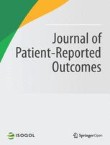The Journal of Patient-Reported Outcomes (JPRO) is an international, open access, multi-disciplinary journal publishing original manuscripts in the field of patient-reported outcomes (PROs).
JPRO will consider original research and review articles, brief communications, commentaries, editorials, and reviews of recent books and software advances relevant to topics 1 through 6, below. In general, JPRO does not publish case reports, articles reporting study designs, pilot studies, or feasibility studies.
The journal uses the ISOQOL Dictionary of Quality of Life and Health Outcomes Measurement1 definitions of PROs, PROMs and PREMs.
Listed below are some examples of the types of papers to be considered for publication in JPRO.
- PROs in clinical trials. Results and methodology for PROs in clinical trials and other clinical studies.
- PROs in clinical practice. Methods and applications of PROs in clinical practice, including individual patient management and using PRO results from comparative studies.
- Patient, family, community, and public engagement. Methods to engage patients, family members, and members of the general public in the process of PRO-related research, policy formulation, and clinical guidelines development, and the evaluation of the effects of such engagement.
- Quantitative and qualitative studies on the development, psychometric evaluations and application of PROs. Application, innovation, and best practices in qualitative, quantitative and mixed methods in the development and use of PRO measures.
- Studies of the social and behavioural determinants of health using PRO measures.
- Patient-Reported Experience Measures (PREMs). Innovative methods of capturing and analysing patient (or caregiver) reports of their experiences receiving care.
Definitions
Patient Reported Experience Measures (PREMs)
Measures related to patient-centered care that cover aspects of the structure and processes of care as experienced by the patient and not interpreted by any other person. Dimensions of the patient experience covered by PREMs include respect for patients’ values and preferences; provision of information, communication and education; coordination of care; involvement of family; emotional support; physical comfort; preparation for discharge, continuity and transitions in care; and access. In the hospital context, PREMs cover aspects of care such as communication and responsiveness of health professionals, cleanliness and quietness of the environment, pain management, and adequacy of discharge information. PREMs are distinct from measures of satisfaction as the latter is strongly affected by expectations and outcomes2.
Patient-Reported Outcomes (PROs)
A measurement of any aspect of a patient’s health that comes directly from the patient without interpretation of the patient's responses by a physician or anyone else. A distinction can be made between those outcomes for which no other interpretation is valid, such as the rating of symptoms or difficulty in carrying out an activity, and those outcomes where verification is possible. For example, the patient can be a good source of information on limitations in physical function, but if need be, the information reported on could be verified by observed performance. The term Self-reported Outcome (SRO) would better represent this type of construct.
- Mayo NE. ISOQOL Dictionary of Quality of Life and Health Outcomes Measurement: Isoqol; 2015.
- Bull C, Teede H, Watson D, Callander EJ. Selecting and Implementing Patient-Reported Outcome and Experience Measures to Assess Health System Performance. JAMA Health Forum. 2022;3(4):e220326. doi:10.1001/jamahealthforum.2022.0326
